PART ONE: NO, PEOPLE DON'T THINK THAT WAY
IT happens every year.
If the city is better for visitors it will be better for us
This time it was a local radio station which was down at the mouth about the great cavalcade of Mancunian past, present and future. They were worrying about what the world was thinking. They were calling me because as a tour guide I've taken 103 different nationalities around on visits of various types over the last two decades so I suppose I'm in a position to shine a light on this aspect of Manchester neurosis.
This time the question, with, of course, a mention of the weather, was: "With the gang problems in Salford, the terrible state of Piccadilly Gardens, the revelation that Oldham is the most deprived town in the country, Manchester and Greater Manchester seem to be in the news for all the wrong reasons. Does this negatively impact on the number of visitors coming to the city?"
The answer is no.
Very few people going on weekend breaks or to conferences look up the crime stats of European destinations before looking up what they might have to offer. In fact I can't recall a single instance of anybody saying they'd done this amongst the thousands of people I've taken around Manchester. Terrorist incidents can focus the mind - Paris tourism was hit after the autumn atrocities, Brussels more recently - but general crime statistics are way down on a visitor's radar (unless they are particularly timorous beasties).
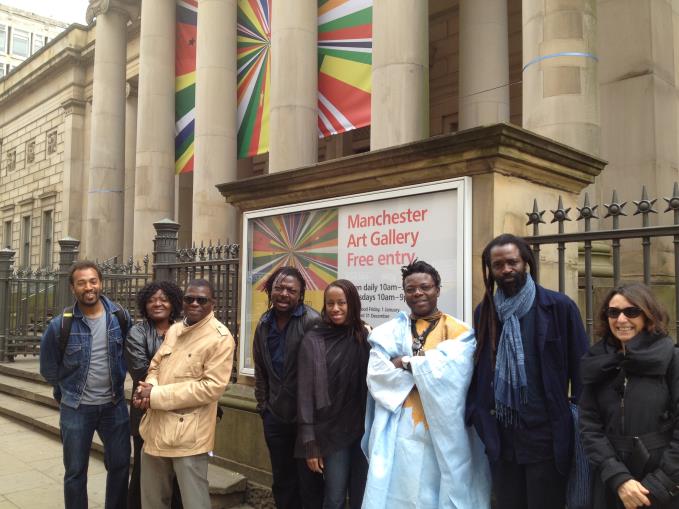 African artists go on a Manchester tour
African artists go on a Manchester tour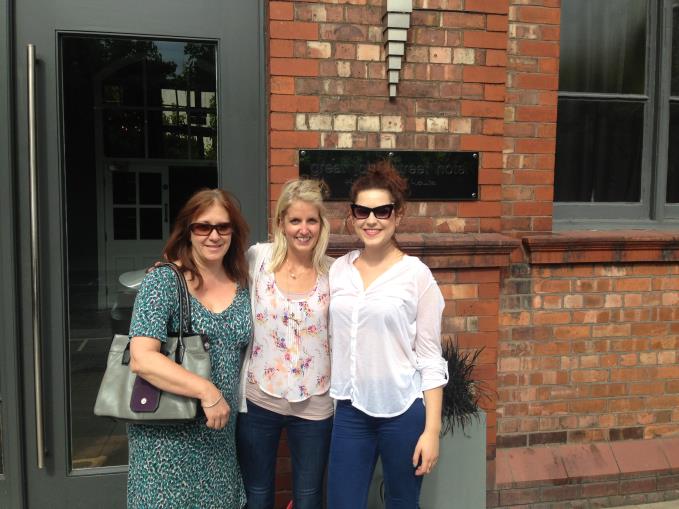 Weekend breakers in Manchester
Weekend breakers in Manchester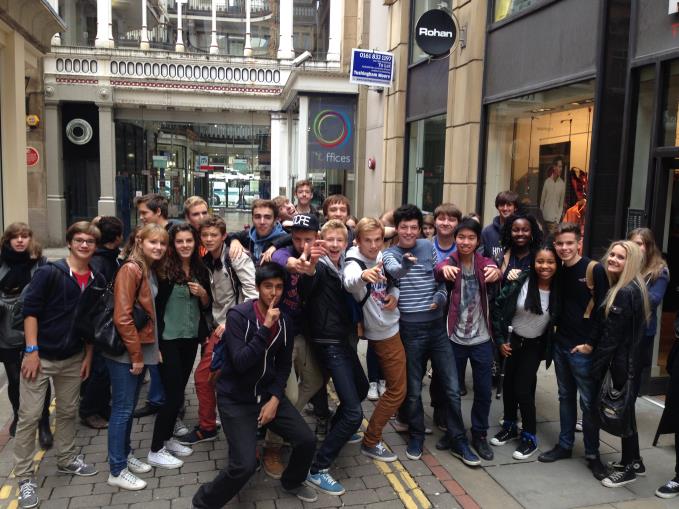 French students enjoying Manchester
French students enjoying ManchesterTouch wood and all that, but I have not had one single occasion of a guest to Manchester since 1996 that has had a pocket picked or a phone stolen let alone been mugged or worse. Not one occasion. And if we look at the crime figures for Manchester then we are no worse than comparable non-capitals in Europe; Hamburg, Lyons, Valencia, often we are better. It astonished me some years ago to find Stockholm had a higher murder and assault rate than Manchester.
The reality is that people are coming to this city for a good time. They want to like the city. They are usually spending their own hard-earned money so they don't come to rubbish it. It is the same with us when we go abroad so why would people coming here do any differently?
As for Piccadilly Gardens, this is a local issue, and thankfully given the rest of the built environment in the city centre, a quickly-walked through blip. We, as locals, want it improved of course and we are fierce about that but a visitor probably thinks Piccadilly Garden is a work in progress rather than a recurring nightmare of poor planning. Instead what they will see is St Peter's Square, or the buildings on King Street, or the amenity of Spinningfields, or the fine Cathedral and Chetham's Library area, or the scale of The Quays, because again we tend as tourists and visitors to remember the highlights of a visit and take photos of those rather than that druggy square where we felt uncomfortable.
The fact Oldham has been in the news scarcely affects tourism to Greater Manchester because few people go there anyway, despite the excellent work of institutions such as Gallery Oldham, while visitors to Britain, if they read the British press at all, won't necessarily associate Oldham with Manchester.
As for the rain... don't make me laugh.
Katrina, a German writer, was in the city in February and said to me: "People talk about the rain here all the time as though it is special. But to us, all of Britain has a reputation for rain not just Manchester, we expect it anyway. Northern Germany is the same."
The lesson is, just because we repeat a cliché in the UK doesn't mean the rest of the world repeats it. The rest of the world thinks of Britain, not just Manchester, and rain as one and the same - if they think of it at all.
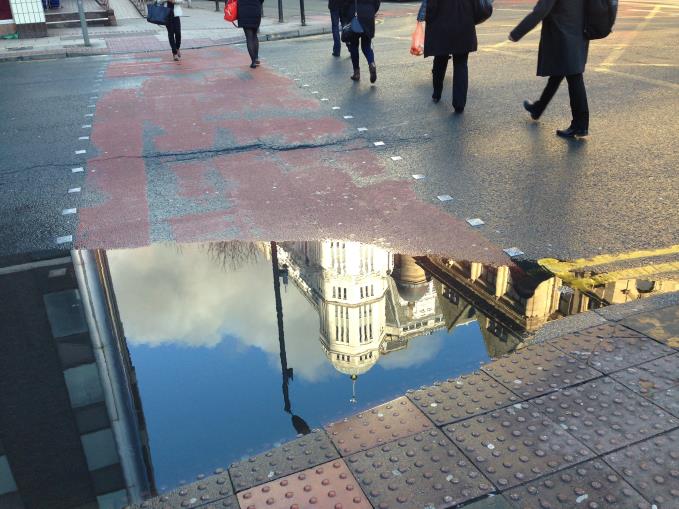 Puddles are not forever
Puddles are not forever 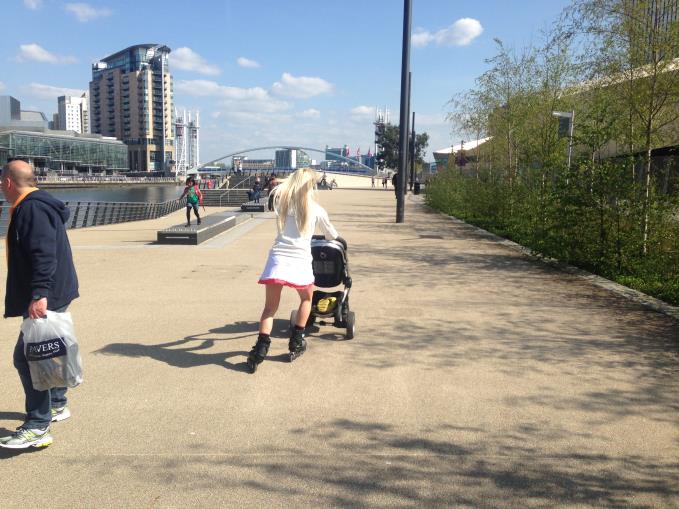 Some visitors enjoy the city in unpredictable ways
Some visitors enjoy the city in unpredictable waysPART TWO: WHY MANCHESTER?
A variety of reasons drag in the visitors: business, conferences, study, conventions, friends and family and of course tourism. Not that as yet we have the same type of tourism as in London or Stratford-upon-Avon. We don’t, as yet, do the package stuff. Visitors usually come here because they really want to, not because it’s on a seven day itinerary of the UK.
If I look at my diaries, people have chosen Manchester for so many reasons I can't actually put my finger on a single dominant characteristic. People have come for The Smiths, Pre-Raphaelite paintings, the Peterloo Massacre, the Bridgewater Canal, Gothic architecture, Coronation Street, the Suffragettes, Friedrich Engels, the Hallé Orchestra, Anthony Burgess, the libraries, football, pubs, ruined mills, ghost tours, to study regeneration, to visit the restaurants, they come for hen and stag parties, for reunions and family trees, and of course for festivals. You think of a theme and I might have guided it.
And although readers might find this curious, in the twenty years I’ve guided the city I can’t think of a guest who left feeling disappointed. I’d like to think this is all down to my guiding skills, of course, but the city speaks for itself. And this is another truth, they often come for one reason and find another reason to delight them. Just as we do when we visit other cities.
Here is a recent note from Marcel, a Dutch professor visiting with his post-graduate students, two weeks ago: 'The soundtrack of our short Manchester visit is still in my head. Manchester made such a brilliant experience. We all loved the vital expressions and the funny humor with that urgent message.'
No, I'm not massively sure what that last sentence means either, but it sounds pretty energised.
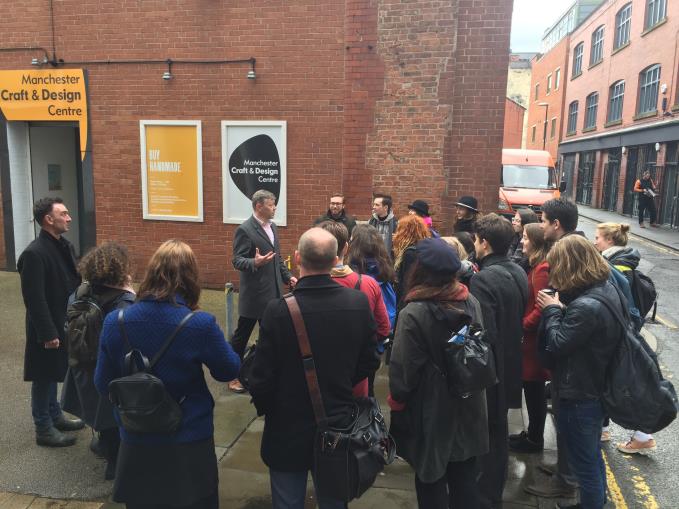 Marcel's Dutch visitors
Marcel's Dutch visitors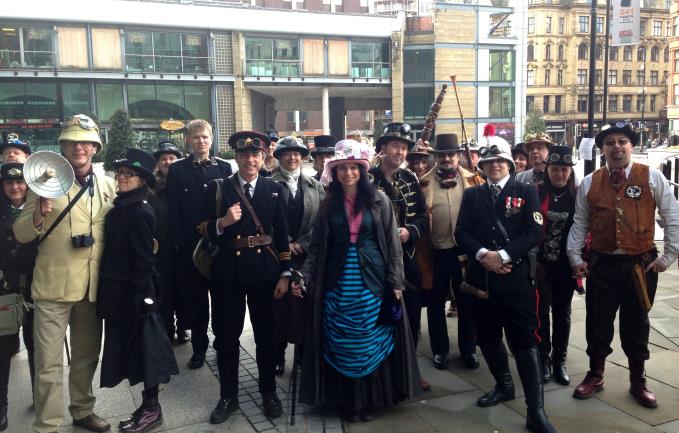 Less traditional guests... or given the costumes, more traditional guests
Less traditional guests... or given the costumes, more traditional guestsWhat Marcel also loved was the fact, despite our local naysayers, that Manchester hasn’t sold its soul to tourism.
Visitors find the city, despite its diversity, remains a very British experience. Intelligent travellers have always wanted to get beneath the skin of a country, to learn about its culture and compare it with their own. You can do this in Manchester in a way you simply can’t in Covent Garden or Oxford, there are too many other tourists in the way down there. Marcel on the tour told me how this was his second time in the city and he loved the place because, "it seems a real place, not a museum".
Sadly, part of Manchester’s problem for visitors is that when they get here, they have Mancs saying to them: “What did you want to come here for?” That's just ignorance - or maybe the comment of a person who simply wants to broil on a beach.
Mancs need to learn just how good their home town is for visitors and this needs to start early. Schools should ensure all Mancs and Greater Mancs know what their city has to offer as part of their basic education. This would be good for the economy; awareness would make the city self-promote better, because I tell you this, if Osaka is exotic to us then Manchester is exotic to the Japanese.
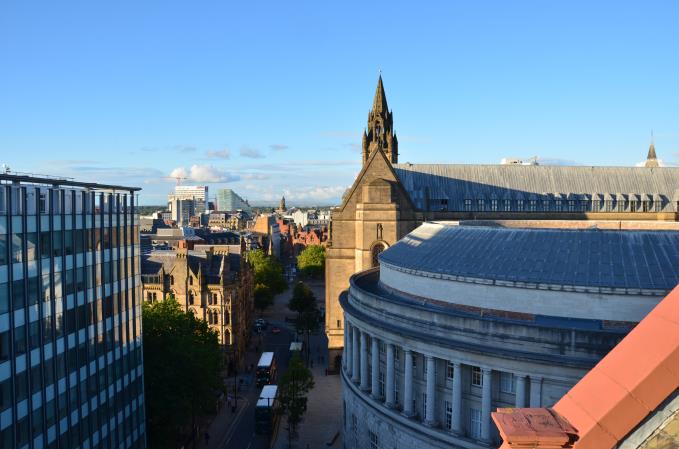 Look more closely
Look more closelyI once took a well-travelled, well-heeled Japanese woman in her thirties from Osaka who was mad for Oasis down Burnage Lane in a taxi showing her where the Gallagher boys had grown up. It was May, it was sunny, the cherry blossom was out in the manicured gardens of the council houses. My lady from Osaka turned to me and said, “this must be one of the most beautiful places in the world.” She was talking about Burnage. The driver nearly swerved into a tree.
One of the best things about my job is that it puts a mirror up to my own city and makes me appreciate it all the more. More visitors to Manchester not only bring economic benefits but psychological ones too.
This does not mean we, as natives, don't question and push our civic and commercial leaders to do things better (as with this Confidential article here), but it does mean we should know how to show-off our own patch of the globe when visitors come.
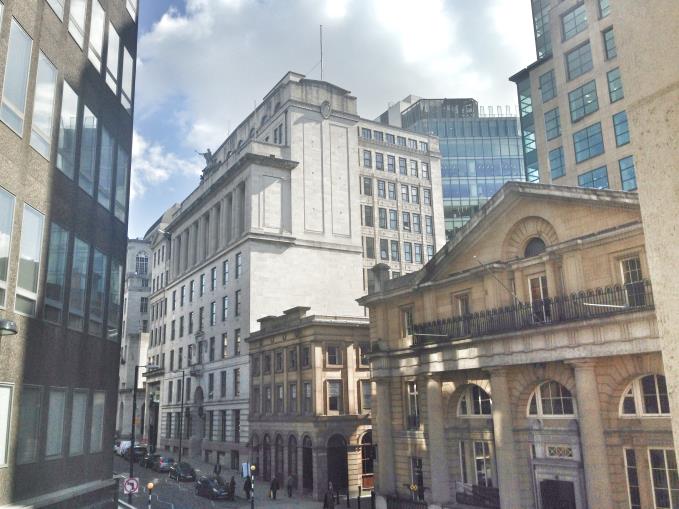 Bold city scene
Bold city scenePART THREE: CITY ANGST
I mentioned the word neurosis earlier in this article.
I see city neurosis or Manc angst as a theme in Manchester's history since the Industrial Revolution.
Manchester was in a hurry back then, doubling in size every few decades, in a largely unregulated manner, making it up as it went along. Manchester went from a small regional town to a major metropolis without all the usual Continental European attributes of old aristocrats, religious elites, medieval guilds, and a tradition of true civic administration. These differences are brilliantly articulated in this article on Confidential by Marina Peña Serrano.
As the nineteenth century became the twentieth, editorials in the Manchester Guardian and debates across the city remarked on how the time had come to think of a real programme of beautification. World War One got in the way as the nation concentrated on the 'national emergency'.
But in the twenties the 'Brighter Manchester' movement was instigated which continued as a theme into the thirties, resulting in ideas such as the city centre park (see this Confidential article), art galleries for Piccadilly Gardens, entertainment complexes on Oxford Road, better housing, the removal of smoke pollution and so on.
But 'Brighter Manchester' was about more than that, it was about festivals, communal activities, it was about a way of life. The Midland Hotel stated how it was going to start a programme of regular dances that would not discriminate between any class of citizen because all had to share in 'ease of life and the gayness of existence'. The Chamber of Commerce produced a book with watercolour images which sums up the aspiration of a sunshine city full of beautiful and impressive spaces.
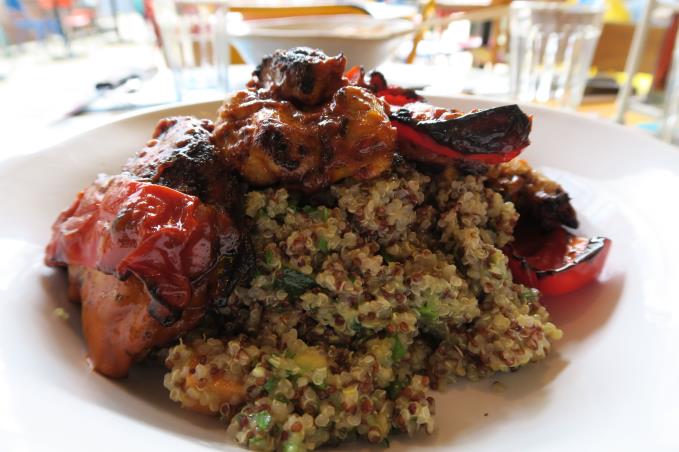 'Brighter Manchester ' imagines the new parks
'Brighter Manchester ' imagines the new parksIt never happened as planned, of course, because the Great Depression, World War Two and post-war austerity became fresh impediments, yet in many ways if we look at the range of activities available in the city centre now, the growth in cultural attractions, the number of festivals, the splendid range of buildings, even with food provision, we are a 'Brighter Manchester'. Immeasurably. (Which is exactly why we feel Piccadilly Gardens is such a disgrace.)
Yet, still I feel that somewhere in the backs of the minds of many city councillors, business leaders, teachers, academics and many Mancunians, there persists a nagging worry that we aren't good enough, that we aren't really a visitors' city, not in the way London or York is.
This lack of confidence, this Manchester neurosis, is where we still fail as a city for visitors.
This is most obvious in the 'little' things, in the maintenance of fountains, hanging baskets and small public gardens, in waymaking, in telling the story of the city to visitors (and for that matter locals) through signage and signboards, in simply clearing the litter. It's as though some people think we don't need these little things carried through as well as they are performed in Chester or York because we're a post-industrial city instead. But oh yes we do need them if we're serious about tourism, because often it's these little things that visitors notice and remark upon. Thus we stumble in appeal through a lack of attention to detail, and as we all know the devil is in the detail. It's curious an issue that seems the easiest thing to fix proves the most intractable.
So while the local radio station was worrying about the wrong things this month the debate around visitors and perception doesn't let us, the people who live here, off the hook. The region faces a huge raft of serious social issues but we need not worry too much of how our visitors see us. They generally love Manchester but, as stated above, we can always be better, because if the city is better for visitors it will certainly be better for its citizens.
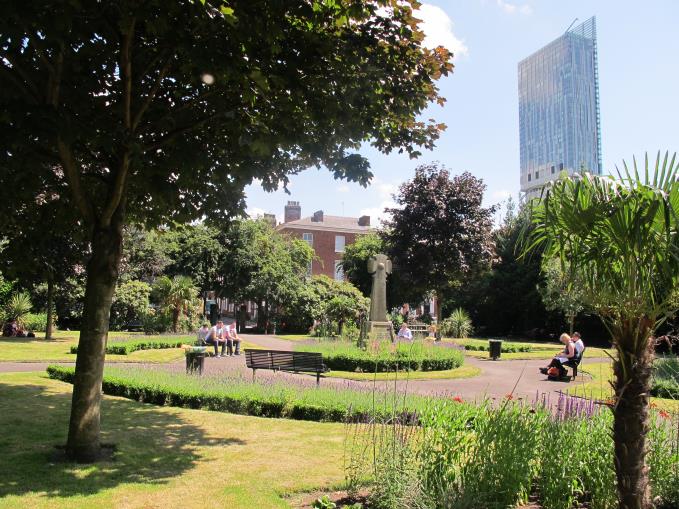 St John's Gardens and other city centre green space has to be maintained like this all the time not occasionally
St John's Gardens and other city centre green space has to be maintained like this all the time not occasionally Canadian film crew in Chetham's Library & Medieval Buildings
Canadian film crew in Chetham's Library & Medieval Buildings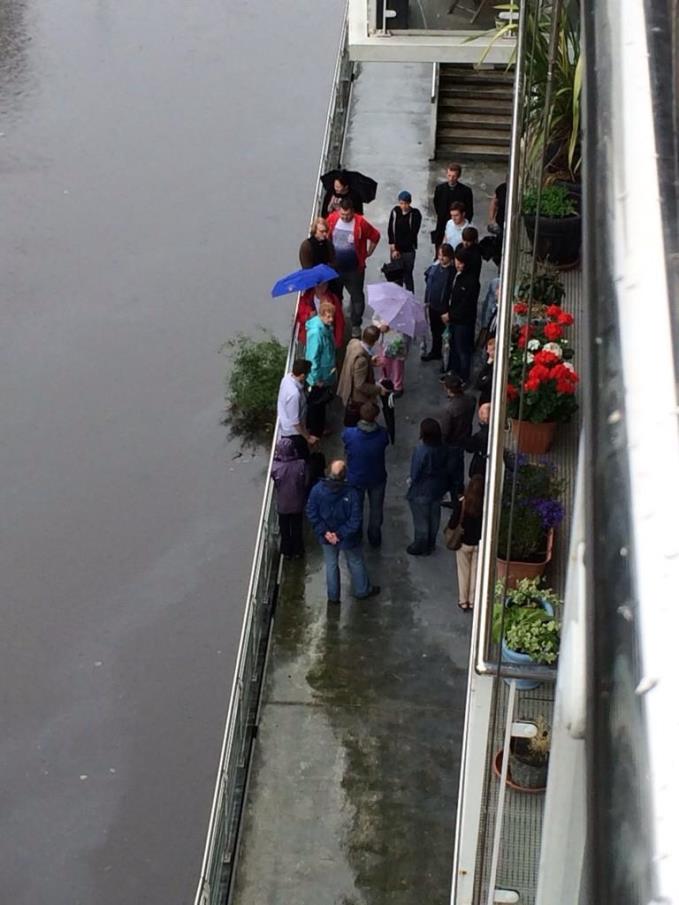 The story can still be told come rain or shine
The story can still be told come rain or shine













